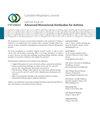Carboxyhemoglobin Does Not Predict the Need of Mechanical Ventilation and Prognosis during COPD Exacerbation
IF 2.1
4区 医学
Q3 RESPIRATORY SYSTEM
引用次数: 0
Abstract
Background Carboxyhemoglobin (COHb) is a complex formed by the binding of carbon monoxide to hemoglobin in blood. Higher COHb levels have been associated with poor prognosis in a variety of pulmonary disorders. However, little is known regarding the prognostic significance of COHb among individuals with chronic obstructive pulmonary disease (COPD) exacerbation. Methods In a retrospective study, we evaluated associations of venous COHb levels on hospital admission with the need for invasive mechanical ventilation, in-hospital mortality, and rehospitalization, among 300 patients hospitalized for COPD exacerbation in internal medical wards. Results Rates of in-hospital death and 1-year recurrent hospitalizations were 11.0% and 59.6%, respectively. COHb levels were not significantly associated with in-hospital mortality (OR = 0.82, P=0.25, 95% CI 0.59–1.15) or with 1-year rehospitalizations (OR = 0.91, P=0.18, 95% CI 0.79–1.04). The mean COHb level did not differ significantly between patients who needed invasive mechanical ventilation and those who were not invasively mechanically ventilated during the current hospitalization (2.01 ± 1.42% vs. 2.19 ± 1.68%, P=0.49). Conclusions Among patients hospitalized with COPD exacerbation in internal medicine wards, COHb levels on admission were not associated with invasive mechanical ventilation treatment, rehospitalizations, or mortality.碳氧血红蛋白不能预测COPD加重期机械通气的需要和预后
背景羧基血红蛋白(COHb)是血液中一氧化碳与血红蛋白结合形成的复合物。在各种肺部疾病中,较高的COHb水平与不良预后有关。然而,关于COHb在慢性阻塞性肺病(COPD)恶化患者中的预后意义,目前知之甚少。方法在一项回顾性研究中,我们评估了300名因COPD恶化在内科病房住院的患者入院时静脉COHb水平与有创机械通气需求、住院死亡率和再次住院的关系。结果住院死亡率和1年复发住院率分别为11.0%和59.6%。COHb水平与住院死亡率无显著相关性(OR = 0.82,P=0.25,95%CI 0.59-1.15)或1年再住院(or = 0.91,P=0.18,95%CI 0.79-1.04)。需要有创机械通气的患者和当前住院期间未进行有创机械通风的患者的平均COHb水平没有显著差异(2.01 ± 1.42%对2.19 ± 1.68%,P=0.49)。结论在内科病房因COPD恶化住院的患者中,入院时的COHb水平与有创机械通气治疗、再次住院或死亡率无关。
本文章由计算机程序翻译,如有差异,请以英文原文为准。
求助全文
约1分钟内获得全文
求助全文
来源期刊

Canadian respiratory journal
医学-呼吸系统
CiteScore
4.20
自引率
0.00%
发文量
61
审稿时长
6-12 weeks
期刊介绍:
Canadian Respiratory Journal is a peer-reviewed, Open Access journal that aims to provide a multidisciplinary forum for research in all areas of respiratory medicine. The journal publishes original research articles, review articles, and clinical studies related to asthma, allergy, COPD, non-invasive ventilation, therapeutic intervention, lung cancer, airway and lung infections, as well as any other respiratory diseases.
 求助内容:
求助内容: 应助结果提醒方式:
应助结果提醒方式:


